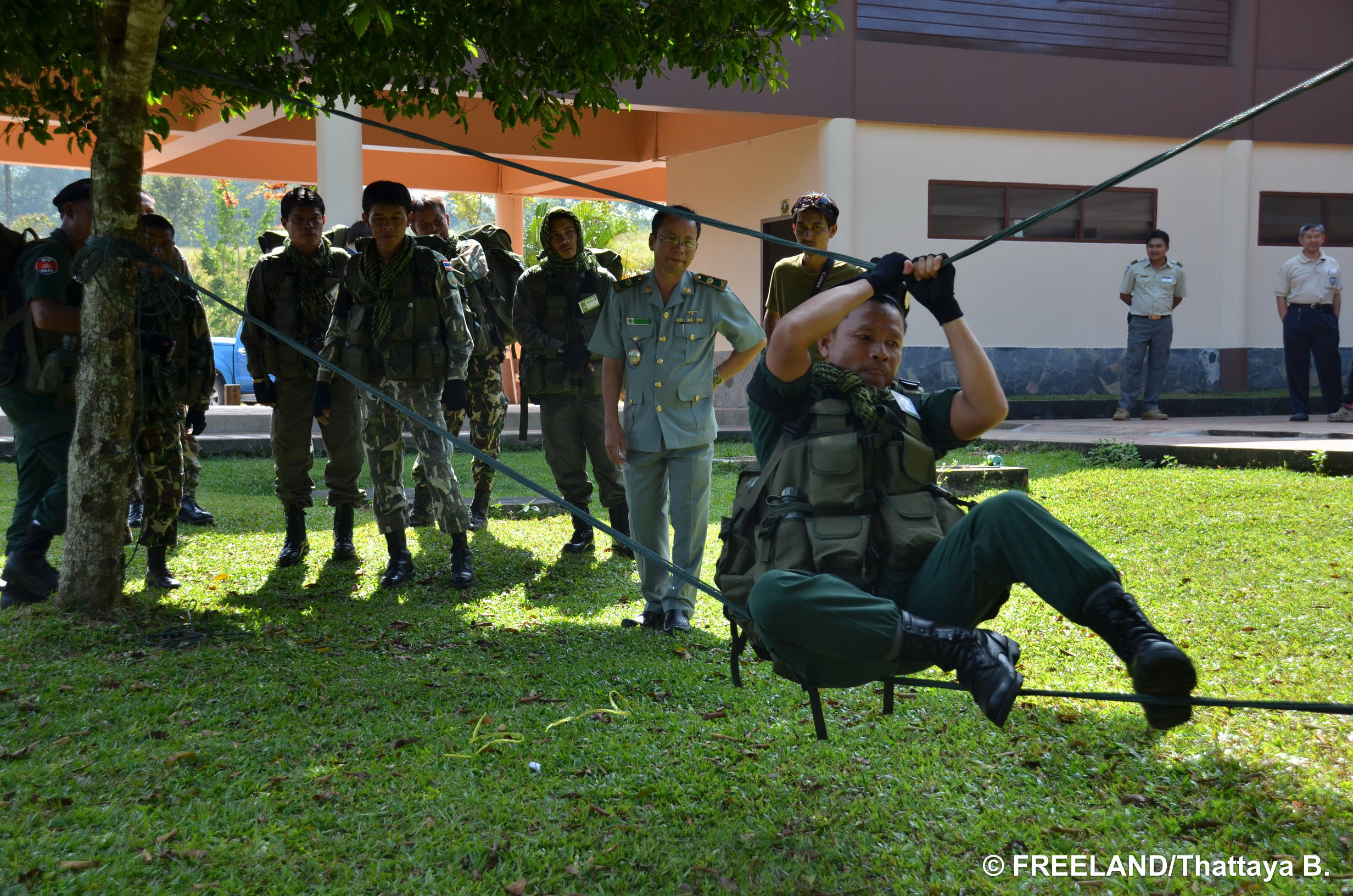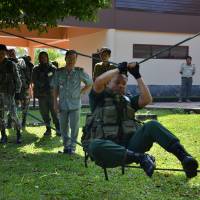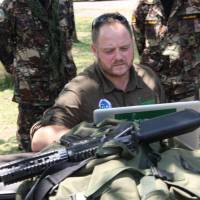It is one of the most poignant photos I've taken during this CITES. We are in Khao Yai (literally, "Big Mountain"), Thailand's first and grandest national park. Peaks and plunges. Huge trees. Waterfalls. And there are elephants and even a few tigers out there. Also rangers and poachers and a largely unnoticed wildlife war.
The photo ingredients: A burly Australian, Sean Willmore, has his computer out on a table in the shade of helpful trees. Sean is director of the International Rangers Foundation.
Watching Sean, with obviously mixed feelings, is a group of rangers from 13 different Asian countries: Bhutan, India, Laos, Thailand, China, Philippines ...
Sean is showing them a list of rangers who have been killed worldwide while doing their job. It makes for grim reading; about 1,000 fatalities in the last 10 years since he started the butcher's bill.
"This is a conservative estimate based on partial data from only 35 countries," he says. The implication is obvious. Many others have died. And died hard. A few lucky escapes — poachers decided to bury one ranger from the Republic of Congo alive in a grilling pit but his mates dug him out.
All the national parks rangers here in Khao Yai have been invited by the Bangkok-based Freeland Foundation, an NGO that specializes in tracking wildlife crime, exposing criminal syndicates, strengthening the capacity of national parks staff and developing alternative livelihoods for poachers.
I have heard Freeland described as "mushrooms and muscle." The mushrooms are grown as alternative livelihoods by former poachers aided and abetted by Freeland advisers. Income is good, and the mushrooms apparently are first-rate.
Freeland's people have various backgrounds, including as investigative journalists, environmental activists and biologists. The field trainers, though, are mainly ex-military skilled in tactics and veterans of operating in hostile forest and wilderness environments.
The military touch is essential. The ongoing wildlife war shows no sign of a ceasefire.
Wildlife trafficking in Southeast Asia isn't a matter of a hungry, impoverished local "shooting for the pot," explains Tim Redford, one of Freeland's principal field trainers — it is a huge business involving skilled and sophisticated criminal syndicates.
ASEAN Wildlife Enforcement Network (WEN), a transnational organization monitoring and combating trafficking, reports that in the past four years 150,000 wild animals have been confiscated in the region. Some are released back into safer areas, many die of stress or have to be destroyed. Nine tons of pangolins have been captured and there's nothing to do but try to feed them ants (which isn't effective) then reduce their remains to ash.
Thailand sits slap in the middle of the wildlife trade routes and its porous borders offer easy access and egress to smugglers.
ASEAN WEN estimates that 153,000 animal and plant parts are smuggled internationally every day in this part of the world.
Wildlife crime is coordinated and cool-headed.
The independent U.K.-based Environment Investigation Agency (EIA), an NGO founded in 1984, states that professional traffickers are more than familiar with CITES — and that, in fact, efforts by it and the EIA — which aims to investigate and expose crimes against wildlife and the environment — might even raise a species' market value. Or lead to hoarding in the expectation of higher prices in the future.
The EIA notes that wildlife crime receives a low priority in many countries, as it is perceived as "victimless." Consequently, for a criminal syndicate, the penalties handed down by courts are regarded as part of a "low-risk, high-profit" business.
Drugs can invite a death sentence. Ivory, pangolins, rosewood, frogs — penalties following these arrests are laughed at.
In Khao Yai, the rangers and the managers are eager to learn.
Being a ranger is an overworked, underpaid and at times a very dangerous profession, as Sean's statistics show.
The poachers mostly active in Khao Yai, which spans 2,168 sq. km at altitudes between 400 and 1,000 meters, don't come for elephants; they come for rosewood trees. They bring rice pots and guns. They shoot gibbons and boar to go with their rice. Elsewhere in the country they set up small sawmills to process their contraband timber.
If a ranger patrol approaches, the timber poachers shoot at them. Sometimes they set booby traps — pipe guns with shotgun shells, a whiff of gunpowder and a trip wire that will fire lethal pellets into a passing Barking Deer or into the legs of a ranger.
The men and women attending the Freeland training session are well aware of the dangers of their work. And if they weren't, they are now. Sean's hardly reassuring. Assassinations; 50 rangers versus 5,000 drugged-up Congo militiamen intent on raping and pillaging; ranger killed by angry rhino; ranger treading on landmine; intimidation; being suspended upside down stark naked by the Venezuela military and anally raped with batons after trying to stop sea-turtle poaching by the military themselves. It goes on, much further.
"Sean," think I, "these guys have enough to worry about! One of their colleagues just got shot and another one had his face ripped off by a bear!"
But the rangers take all this horror in their stride. They seem to become more determined.
Sean sweetens the bitter pill. His organization will pay $1,000 to any ranger killed. "Unless they're drunk or commit suicide. Which rules all of you out!" There's laughter.
Every ranger is issued with a Freeland kit: water bottle, combat fatigues, cookpot for brewing tea or rice and, cor blimey, a tablet. Not for malaria or suicide; a Sony tablet computer. All the course material is there, all the group photos. But most importantly they leave with training, support and companionship. Back into the forests. Back into the war.
"The poachers keep coming," says one ranger, "and we will be there to say 'hello and goodbye.' "





















With your current subscription plan you can comment on stories. However, before writing your first comment, please create a display name in the Profile section of your subscriber account page.